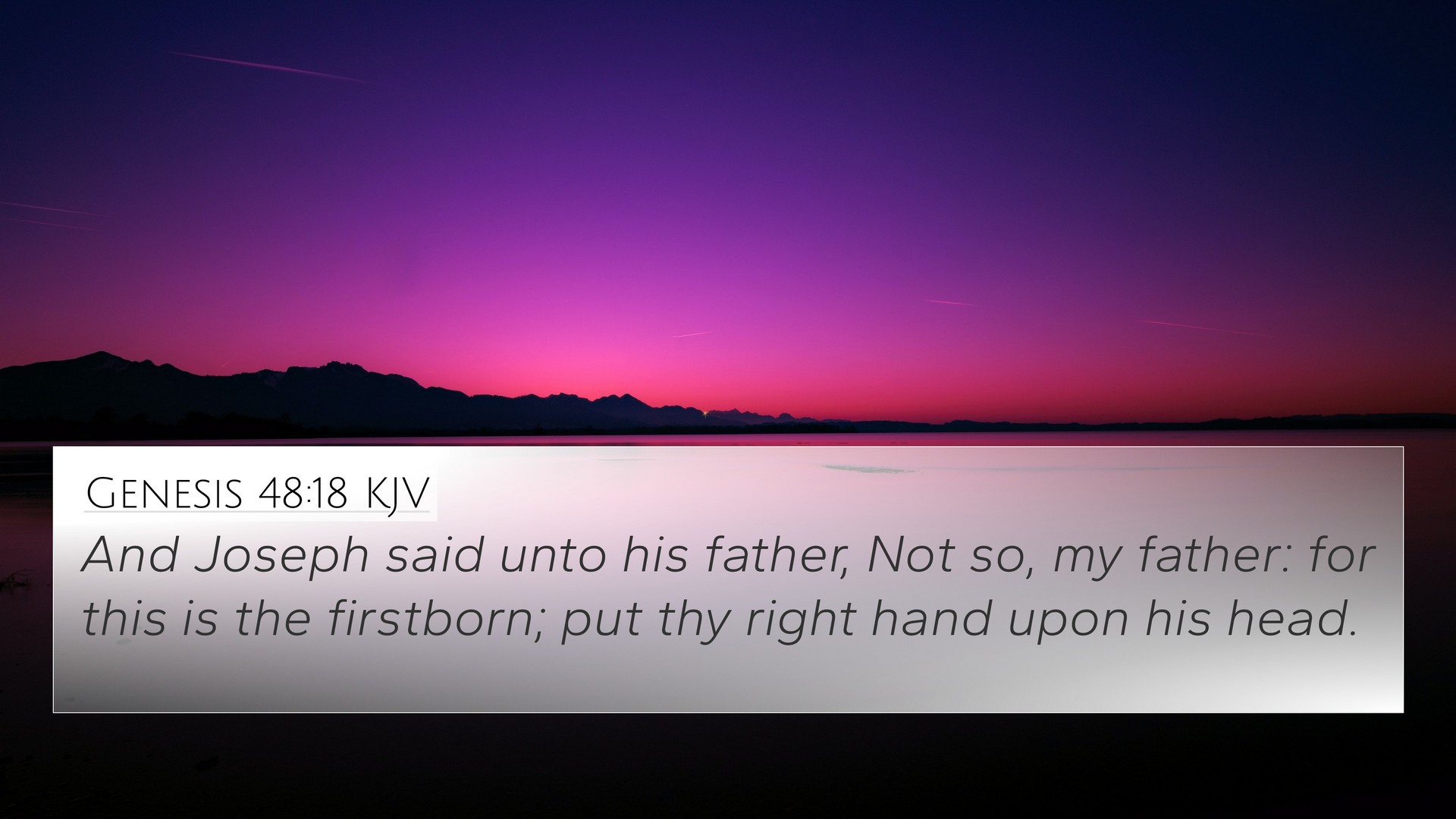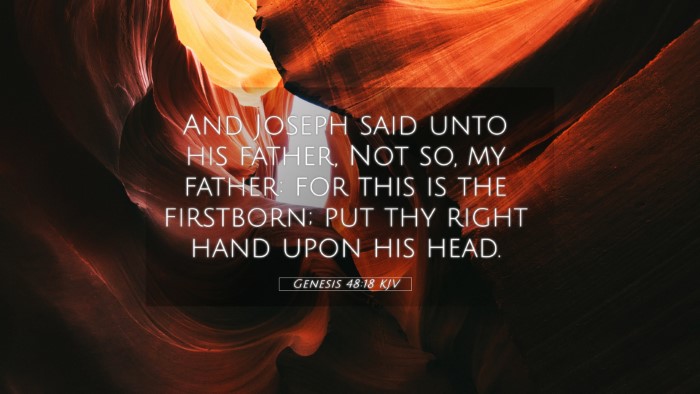Bible Verse Meaning: Genesis 48:18
Verse: Genesis 48:18 - "And Joseph said unto his father, Not so, my father: for this is the firstborn; put thy right hand upon his head."
Summary of Interpretation
Genesis 48:18 engagingly illustrates the deep emotions and intentions surrounding the blessing imparted by Jacob to Joseph's sons, Ephraim and Manasseh. This verse highlights the tension between cultural conventions of primogeniture, where the firstborn is traditionally favored, and God's sovereign will in choosing who will receive His blessings. The commentary reveals how Jacob's actions challenge societal norms, symbolizing a divine order that transcends human traditions.
Commentary Insights
-
Matthew Henry's Commentary:
Henry emphasizes Jacob's deliberate choice to bless Ephraim over Manasseh, despite Manasseh being the firstborn. This act reflects God's purpose in elevating those whom He chooses for His blessings, showing that divine decisions can diverge from human expectations.
-
Albert Barnes' Notes:
Barnes interprets this moment as significant for understanding the continuity of God's covenant. He notes that Joseph's intervention symbolizes an attempt to preserve the traditions of blessing, thus highlighting the human struggle to comprehend divine insights.
-
Adam Clarke's Commentary:
Clarke situates this passage in a historical context, explaining that traditional rights of inheritance were crucial for the tribes of Israel. He accurately frames Joseph's objection as not merely protective of his firstborn but reflective of a broader understanding of God’s fidelity to His promises.
Bible Cross-References
This verse relates closely to other important scriptures:
- Genesis 27:19-29: Jacob's blessing of his sons, illustrating the complexity of blessings and inheritances.
- Genesis 49:22-26: Jacob's blessings on Joseph which expand the significance of his progeny.
- Romans 9:12-13: "The elder shall serve the younger," indicating God's choice in blessings apart from birth order.
- 1 Chronicles 5:1-2: Reflects on Joseph's lineage and emphasizes the role of Ephraim and Manasseh in Israel's history.
- Hebrews 11:21: Jacob’s act of worship through blessings links to faith and the promise given to the forefathers.
- Luke 3:23-38: The genealogy of Jesus linked back to these patriarchs signifies the importance of their lineage and God's plan for salvation.
- Colossians 3:24: God’s promise is affirmed where believers can receive their inheritance, underscoring the spiritual dimension of this blessing.
Understanding Biblical Themes
Genesis 48:18 embodies themes central to the biblical narrative, including:
- Divine Election: God's purpose often diverges from human expectations, revealing a deeper plan.
- Inheritance and Blessings: The transfer of blessings is pivotal in understanding the continuity of God's covenant.
- Faith and Obedience: The challenge between tradition and divine directive calls believers to reflect on their faith responses.
Applying Cross-Referencing Techniques
For those exploring cross-referencing techniques, this verse offers numerous pathways for deeper study:
- How to Find Cross-References in the Bible: Utilize a Bible concordance to identify themes related to blessings and elections.
- Identifying Connections Between Old and New Testaments: Explore how familial blessings in Genesis inform New Testament faith teachings.
- Cross-Referencing with Psalms: Investigate how the Psalms echo the themes of divine choice and inheritance.
Tools for Bible Cross-Referencing
To synthesize interpretations and scripture connections, consider utilizing:
- Bible Cross-Reference Guide: A helpful tool in making thematic connections across books.
- Cross-Reference Bible Study Methods: Techniques that enable comprehensive analysis of thematic parallels.
- Bible Reference Resources: Various guides and tools can aid in tracing scriptural themes effectively.
Conclusion
Genesis 48:18 presents a profound opportunity for deeper exploration within the larger tapestry of Scripture. Through the lenses of commentary insights and thematic studies, readers can uncover the multifaceted relationships between biblical texts, enriching their understanding of God's divine plan.











